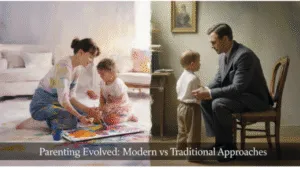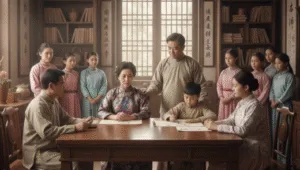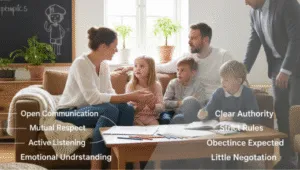Modern vs traditional parenting. In an era where parents navigate between structured discipline and collaborative approach, the tension between modern parenting and traditional parenting reveals itself not in opposition but in adaptation. While traditional methods rely on clear authority and hierarchical structure, the modern lens emphasizes flexibility and mutual respect, creating what many call a hybrid approach that incorporates elements of both worlds.
The reality is quite similar across households: whether opting for strict rules or open dialogue, every parent ultimately aims to nurture well-rounded individuals capable of independent thinking while maintaining a sense of security proving that modern vs traditional parenting isn’t about choosing sides but understanding how cultural influences, family’s values, and child’s temperament shape our deeply personal choices in this evolving journey.

Understanding Traditional Parenting / Key Features of Traditional Parenting
- Traditional parenting remains rooted in authoritative figures maintaining clear family hierarchy, where parents instill discipline and order through structured approaches that have shaped families across generations, reflecting past traditions that many still value in today’s world. This parenting style operates on five core principles:
- Clear consequences and consistent rules form the protective framework, with authority establishing expectations through top-down instruction rather than negotiations.
- Respect for established societal norms guides children through specific rites of passage and milestones, teaching humility and responsibility within the family unit.
- Structured formal education with a strong focus on academic achievement prepares young people for adulthood, emphasizing predictability and order.
- Extended family and community support leverages broader networks, contrasting with nuclear family setups that dominate modern approaches.
- Gender-specific responsibilities maintain a clear division of parental roles, with limits on two-way communication as parents enforce boundaries through a form of authority rather than mutual agreement.

Understanding Modern Parenting / Key Features of Modern Parenting
Modern parenting reflects how innovations and cultural shifts have transformed the way families operate, creating a dynamic approach that accommodates the ever-progressing world we live in. This style must prioritize flexibility and adaptability, and it must remain responsive to each child’s needs rather than applying rigid formulas.
Key Features:
- Integrates technology into daily life through educational apps and online resources, using digital communication tools for enhanced learning opportunities while maintaining minimal use where face-to-face interaction matters.
- Emphasises open dialogue where children’s opinions are valued and considered, fostering trust and mutual understanding through listening and creating a climate where children feel valued and heard.
- Encourages experiential learning and critical thinking alongside emotional intelligence and creativity in academics, placing importance on developmental benefits beyond traditional schooling.
- Employs positive reinforcement and natural consequences instead of harsh punishments, gently redirecting negative actions through discussions while communicating and guiding toward stronger parent-child bonds.
- Promotes gradual independence by involving children in decision-making processes, offering guidance while respecting their growing autonomy with shared responsibilities and greater emphasis on equality between parental roles.

Discipline and Control / Positive Guidance or Organized Settings
Modern vs traditional parenting. In modern approaches, positive discipline emerges through empathy and understanding, where parents act as guides rather than authority figures—tuning into their child’s emotions while setting boundaries that balance open communication with clear, consistent rules. Traditional methods embody structured environments rooted in obedience and respect for authority, where punishments are typically used to enforce discipline, creating predictable frameworks with clear distinctions between parental roles and child roles that provide a sense of stability through fundamental principles rather than blurred lines.

Approach to Communication / Two-Way Dialogue VS. Directive Leadership
In modern parenting, open communication becomes the guiding light where parents prioritise creating an environment where children feel heard and respected, allowing them to express their feelings without fear of judgment—this emphasis on understanding helps foster stronger parent-child relationships where the blurred lines between friend and authority figure can sometimes create confusion about boundaries.
The Danish way of parenting demonstrates how balance works when parents maintain clear expectations while staying adaptable to their child’s needs, proving that communication doesn’t mean abandoning authority but rather tuning into your child’s emotions while still providing the structured framework they need to thrive modern approaches lean toward dialogue where parents seek to comprehend the world from their child’s perspective, whereas traditional methods rely on clear authority where parents serve as authority figures with clear distinctions in parental roles and expectations, leaving little room for negotiation but ensuring children understand exactly where they stand.

Learning Strategy
In modern parenting, the educational landscape has shifted toward adaptability and individual growth, where parents encourage children to learn through mistakes while relying on technology for learning opportunities that enhance cognitive development.
This approach stands in stark contrast to traditional methods that typically used direct, face-to-face interaction with strong disciplinary foundations, where teaching was focused on collective responsibility and extended family played a greater role in raising children, yet both styles must prioritize building confidence and must ensure children find their path to becoming well-adjusted individuals.
The difference lies not in which is better or worse per se, but in understanding that educational strategies should blend elements that work best for each child’s needs, whether through technological integration or community support systems that provide necessary guidance for healthy development.

Parent Duties
In traditional parenting, clear role definitions were the cornerstone of family structure,in which child roles remained limited and were predominantly shaped by authoritative-style expectations. Parents enforceddiscipline while children learned obedience through structured environments. Modern parenting,in contrast, emphasizes open communication, with parents prioritizing building a strong connection by validating their children’s feelings and promoting self-expression, a perspective that differs significantly from thatof previous generations.
This contrast becomes pronounced when we note that Chelsea Acton’s famous parenting tips often highlight how teaching empathy and understanding must create a profound understanding between parent and child, where the fundamental principle encapsulates supporting rather than just directing. What sets these approaches apart is how each embodies different beliefs:authoritarian-style families might view deviation as disrespect, while child-centered homes must see it as an opportunity for growth, with the ultimate goal ofraising children who feel secure while becoming autonomous individuals.
The article tackles these differences not to label one overly strict or another too permissive style, but to help parents recognize that finding balance through consistent communication and setting boundaries creates a nurturing, supportive environment where every personal journey evolves based on changing societal norms, technological advancements, and what truly serves each unique family’s values.

Technology Utilization
In the digital age, modern vs traditional parenting approaches diverge dramatically when examining screen time and device integration, where modern vs traditional parenting philosophies clash most pronouncedly around entertainment choices and heavy use of gadgets. Usually associated with self-reliance building, today’s gentler approach to valuing technological fluency often uses tablets as important tools for learning, whereas yesterday’s methods emphasized less reliance on screens and a limited technological influence in daily routines.
Contemporary families adjust their parenting practices by leveraging technological savvy for educational purposes yet must try to set limits on excessive screen time to prevent isolation and possible negative impacts on children’s health, whereas earlier generations operated within rigid frameworks that encompasses minimal device exposure an uninvolved style regarding digital literacy that now seems outdated given interest in preparing kids for our screen-dominant world, though both parenting styles entails consistency in whatever boundaries parents establish, whether framing technology as entertainment reward or important tool for enrichment the key differences lie not in delveing into devices themselves but in teaching intentional use that pushes.
communication skills rather than creating communication barriers, especially since over-reliance creates risk of behavioral issues and feelings of disconnection if insufficient boundaries exist, making it essential to integrate ways of family connection that avoid overuse while staying connected through both digital and traditional interactions, as three other styles beyond uninvolved style all recognize importance of balancing screen time with face-to-face interacting, and ultimately the most effective strategy involves parents who make clear their set expectations with conciseness rather than leading to confusion.

Cultivating Empathy, Compassion, and Resilience
Modern vs Traditional Parenting. As a parent who has navigated both philosophies, I’ve learned that helping children develop emotional intelligence requires more than lectures—it must involve showing them how to recognize pain in others while they’re gradually processing their own feelings.
The beautiful journey of raising emotionally aware kids must include moments where you guide them through conflict rather than imposed restrictions that shut down vulnerable conversations, because resilience isn’t built through protection but through the process of working through disappointment alongside someone who ensures they won’t face it alone. This type of intentional presence, marked by patience during their ups and downs, creates children prepared to handle life’s setbacks without losing their capacity for compassion.
Advantages and Disadvantages of Modern Parenting vs Traditional Parenting
Modern parenting renders children with independence through technology and flexible boundaries, yet this increase in autonomy sometimes creates challenges when kids face difficulties without the strong sense of conviction found in stricter approaches. The core element lies in teaching empathy while giving tools for resilience, as interacting with others from an early age builds self-worth, though support mechanisms differ vastly—traditional parenting emphasizes thinking through setbacks with adversity met head-on, whereas contemporary methods focus on understanding emotional experiences within their realm of feelings.
Nonetheless, both show merit in helping a child cope with life’s complexities, as parents realize each set of methodologies brings potential challenges alongside respective strengths that significantly impact their child’s development. Traditional parenting often provides a certain set of rules creating consistent boundaries where respect is usually found through structure, making it a good option for families feeling secure in established patterns, yet this approach can illustrate rigidity that limits emotional expression.
Meanwhile, modern methods embrace teaching resilience through open dialogue and additional support systems, helping children become happy, healthy individuals, though critics discuss whether excessive flexibility lead to confusion. This article explores how two popular approaches offer good options for following either path or creating a mix of both, as the important thing remains adapting strategies based on various factors, including personality and circumstances rather than believing these are mutually exclusive—many parents adopt elements from each, shedding light on how no right or wrong answer exists since it depends on individual family dynamics.
Faqs
Q1: Is there a perfect parenting approach that will bring forth the best results?
Ultimately, there’s no one-size-fits-all solution; both modern and traditional approaches carry advantages and disadvantages, meaning neither is superior at the end of the day.
Q2: What should be the main goal when choosing between parenting styles?
The goal is to create a dynamic environment where children thrive and become equipped to navigate the complexities of the modern world, ensuring their well-being and positive development matter most.
Q3: How can parents find a balance between different approaches?
Tips suggest keeping an open mind about different perspectives and using technology wisely, as finding a balance becomes crucial since one case doesn’t define all—perhaps what works today needs adjustment tomorrow.
Q4: What happens if parents don’t balance their approach?
Unfavorable results might occur without balance, making it a good idea to realize this endless journey of lifetime chosen parenting styles influenced by personal strengths and differences will have wins and struggles.
Q5: What truly matters despite parenting worries?
Moreover, understanding this active journey meansstayingtuned to children’s needs despite worries and fears—whether choosing structured discipline or flexible guidance, ultimately love hearts every home beyond any conclusion.

